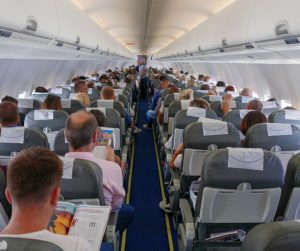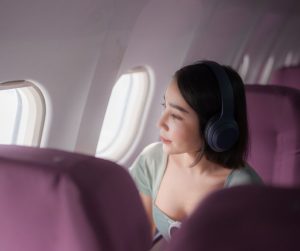The world of air travel is a captivating one, full of promise and excitement. For individuals with the majority of vestibular disorders, it’s essential to know that flying is not only an achievable dream but also a safe one.
In this blog, we’ll explore the safe and empowering aspects of air travel for vestibular sufferers, celebrating their resilience and offering tips for a fulfilling flight experience.

Safe Skies for Vestibular Traveler’s:
First and foremost, it’s crucial to highlight that flying with the majority of vestibular disorders is perfectly safe and generally doesn’t have any adverse impact on your condition.
Modern aviation is designed with passenger comfort and safety in mind, including those with specific health concerns like most vestibular issues.
The Triumphs of Flying with Confidence:
- Personal Empowerment: Choosing to board a flight despite vestibular challenges is a profound act of personal empowerment. It’s a declaration that your condition will not hinder your thirst for adventure.
- Explore Uncharted Horizons: Air travel opens doors to uncharted horizons. Vestibular sufferers can venture to far-flung destinations, creating memories and experiences that transcend their condition.

Empowering Tips for an Enriching Flight Experience:
- Seek Professional Guidance: Before your journey, consult a Chartered Vestibular Physiotherapist who specialises in vestibular disorders. Their expert advice will boost your confidence, as they’ll confirm if flying is safe for you and may recommend personalised strategies.
- Optimal Seating: When booking your flight, select a seat over the wings or in a location with minimal motion. This choice minimises the impact of turbulence and enhances your comfort.
- Hydration is Key: Staying hydrated is a fundamental strategy for symptom management. Prioritise water intake before and during your flight, and avoid excessive alcohol or caffeine consumption.
- Medications When Needed: If you have been prescribed motion sickness medications, utilise them as directed to ensure a smooth and enjoyable flight.
- Mid-Air Exercises: Gentle head and neck exercises during the flight can alleviate symptoms and maintain equilibrium.
- Noise-Cancelling Serenity: Noise-cancelling headphones create a serene environment, shielding you from engine noise and other distractions, enhancing your flying experience.

Conclusion:
Flying with the majority of vestibular disorders is not only safe but also an opportunity to rise above challenges and savour the wonders of the world. With determination, the guidance of your Chartered Vestibular Physiotherapist, and a positive mindset, air travel can become an empowering adventure.
Remember, it can be perfectly safe to spread your wings and explore the world; your condition need not hold you back. So, embrace the skies, and let your adventures take flight, for the world is waiting to be discovered.
Remember:
If you are interested in booking an appointment with one of our Specialist Vestibular Chartered Physiotherapists that specialises in Vestibular Rehabilitation or simply need some guidance, then please give us a call on 021 4633455 or book online below.
We hope you enjoyed this blog by Sheila Barrett, Specialist Vestibular Chartered Physiotherapist.
This blog is provided for information purposes only. The content is not intended to be a substitute for professional medical advice, diagnosis or treatment. Seek the advice of your doctor with any queries regarding a medical condition.
